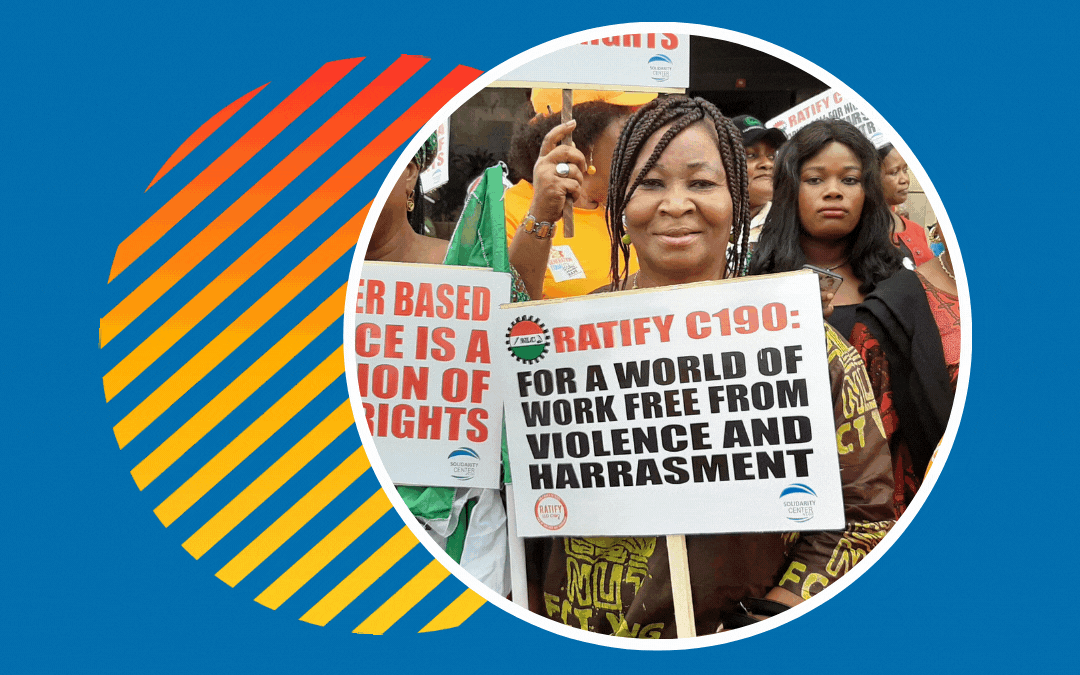
NIGERIA: UNIONS ALLY WITH GOVERNMENT, CIVIL SOCIETY ON HEAT STRESS
Built on research commissioned by the Solidarity Center, the Nigeria Labor Congress (NLC) and Trade Union Congress (TUC) in May launched a heat stress campaign with other civil society groups and government in Abuja to address the impact of worsening heat on Nigeria’s working people—especially those who earn their living outdoors, such as on construction sites or in agricultural or oil fields.
“The campaign is key to promoting environmental justice, occupational health and safety, and a safe working environment for Nigerian workers and Nigerians in general,” said NLC Senior Assistant General Secretary Eustace James.
A lethal heat wave that overwhelmed hospitals and mortuaries in some parts of West Africa last month is a warning of similar events to come with increasing frequency, predicts international climate scientist network World Weather Attribution (WWA).
The “Stop the Heat Stress” climate justice campaign features data collection through sector-union surveys as well as street rallies and visits to state legislators and administrators to raise awareness of the impact of climate change on worker health and safety.
A key preliminary finding of the unions’ climate impact research is the worrying impact of heat stress on workers’ mental health. Prolonged exposure to high temperatures at work reduces productivity and increases the risk of injury, disease and death, reports the International Labor Organization (ILO), which is recommending employer and government mitigation measures. Indeed, an intense heatwave in April likely killed “hundreds or thousands of people” across West Africa. And the summer of 2023 recorded some of the highest temperatures on record for the entire planet, having significant consequences for human life, including in the world of work, warned the ILO.
To ensure that climate-related legislation and policies prioritize worker health and safety and their economic survival, the union campaign is partnering with Nigeria’s Environment and Labor Ministries, governmental bodies involved in environmental efforts, including Nigeria’s National Council on Climate Change (NCCC), and environmental civil society organizations.
The Nigeria Labor Congress (NLC), one of the country’s two labor federations, continues to call for the immediate inclusion of workers and their unions in the governing structures of the NCCC—in part to protect those working in the agricultural sector, where almost half of all job losses are expected to occur. New climate policies—whether designed to mitigate or respond to worsening impacts—will inevitably impact working people. To ensure that these policies protect and build resilience for workers and their communities, unions must be meaningfully included in their development.
“The grim reality that 81.4 percent of Nigerian workers lack insurance against potential job losses brings to the fore our demand for social protection to protect vulnerable workers,” said the NLC’s Uche Ekwe, representing NLC General Secretary Emma Ugboaja.
The NLC and TUC are umbrella unions that together represent millions of workers in Africa’s most populous nation. Nigeria’s poverty rate was estimated to have reached almost 40 percent in 2023, with an estimated 87 million Nigerians living below the poverty line, the world’s second-largest poor population after India.
“[There must be] intensity in ensuring safety and climate justice for all,” said James.

